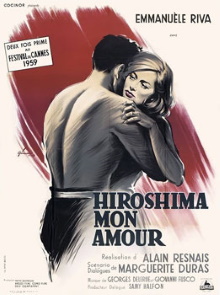
Even after years at it, revisiting the great classics of cinema is a never ending affair and so here we have one of the earliest and most famous exemplars of the French New Wave movement. The director is of course Alain Resnais but I think we should also give due credit to screenwriter Marguerite Duras. I also note that the producers of the film stipulated that one of the main characters must be French and the other must be Japanese and scenes must be shot in both countries. So labouring under these restrictions, Resnais and Duras created this thoroughly unique film.
A French actress is in Hiroshima, Japan to shoot a film about the war. She has a fling in her hotel room with a Japanese man who says that he is an architect and also dabbles in politics. Both are unnamed. At first they speak about the horror of the atomic bombing in the city and the suffering of the people. But inevitably they ask about where the other was when it happened. The man says that he was a soldier fighting in the war but his family was present in the city. The woman says that she was in the city of Nevers where she grew up and recounts her passionate relationship with a German soldier during the war as well as the aftermath. Though both originally meant their relationship to be a brief affair and the woman has to leave Japan soon, the man declares that he has fallen in love with her while the woman feels conflicted.
This film is densely packed with themes, meanings and subtleties, yet it is never cryptic nor even all that difficult to parse. Its great genius looks to be tying these disparate threads together, forbidden love between enemies in a time of war, the incomprehensible suffering of the victims of the atomic bombing and the certainty that no matter how powerful one’s feelings and making a whole that is much greater than a simple sum. Who else could have thought of bringing these together into one film? But then when I read about this was a restriction imposed on Resnais as a result of this being a French-Japanese co-production, this suddenly turned into a case of an accident of the production being co-opted to make truly great art. Furthermore, though this is harder to appreciate without a broader understanding of the history of cinema, this film is said to have expanded the language of film in innovating techniques that all later directors would copy. It is certainly notable for its use of repetition to emphasize a point, something that Resnais would go on to make greater use of in Last Year in Marienbad, but even small things like the brief flashbacks that we are all used to now, was apparently new then.
The photography throughout is incredible as well. The shock of watching the damage inflicted by the atomic bomb is enough to rattle the most jaded of audiences and lends gravity to this meeting by happenstance of two random people in Hiroshima. The shots of the streets of the Japanese city are striking as are the faces of the people who live in it as we know that they live beneath the shadow of the bomb. By contrast the scenes that are shot in France stand out less, as Resnais mostly restricts himself to the cellar where the woman is held prisoner by her own family or brief shots of street names and facades of buildings to establish a sense of place. But then he makes up for it with the woman’s verbal description city, playing with the name Nevers itself on her tongue and claiming that the name itself has no meaning with French while at the same time repeating the words: Nevers, jamais. It’s just one more small example, amidst countless others, of the richness of the film.
Sometimes you watch a film that you can tell is a masterpiece but you are nonetheless stymied by an inability to fully understand what it is trying to say. Other times, you may get what is going on and appreciate its greatness, but not actually enjoy watching it very much. To me, Hiroshima mon amour is a film that hits all of the high points at the same time. You can immediately perceive that it is a masterpiece, there is no point at which you are left in confusion and it is a real pleasure to watch it throughout, especially with its profusion of small in-jokes and references. This is a film that every cinephile really must watch.